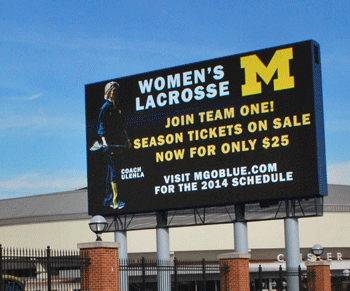Column: Tilting at Billboards
The Ann Arbor city council’s post-election meeting agenda for Nov. 7, 2013 would be heavy enough without the addition of an item that will almost certainly serve no purpose except political theater.

This animated .gif is purely the product of The Chronicle’s “art department” and is not intended to imply even indirectly a willingness by the University of Michigan athletic department to provide a slot in the marquee’s message rotation for city of Ann Arbor public service announcements.
The council will be considering a resolution that asks the University of Michigan to decommission the $2.8 million digital marquee recently constructed by the university’s athletic department. I don’t think the university is going to give that any thought.
In this unnecessary drama, Christopher Taylor (Ward 3) appears to be playing the role of Don Quixote, with four councilmembers auditioning for the role of Sancho – Marcia Higgins (Ward 4), Margie Teall (Ward 4), Sally Petersen (Ward 2) and Jane Lumm (Ward 2). Those five are co-sponsoring the resolution. [If the council really wants to tilt at windmills, the city could have a literal one soon enough.]
The council’s Nov. 7 resolution cites the city’s own recently enacted sign ordinance, which constrains the deployment of digital technology for outdoor signs. According to the resolution, the marquee inflicts the same harms on the community that the city’s newly amended ordinance sought to prevent. [Petersen and Higgins, however, voted against that ordinance.] Those harms are described in the resolution as “distract[ing] motorists and substantially degrad[ing] the community viewshed…”
As the text of the council’s Nov. 7 resolution itself concedes, the University of Michigan is “without any obligation to comply with the ordinances of the city of Ann Arbor” – so the fact that the UM’s marquee rather flagrantly flouts the city council’s sign ordinance is of no consequence.
What is semantically bizarre about the text of the resolution is its contention that by turning the marquee off, or by limiting its use, the Ann Arbor community would be delivered a “material benefit.” If the council’s position really is that the marquee is doing harm, then by no rational standard should the mere mitigation of that perceived harm be labeled a “benefit,” much less a material one.
By way of analogy, if a chemical company is dumping toxic sludge onto my property and jeopardizing my health, then it’s not really a “benefit” to me if the company were to stop doing that. But it could be considered a benefit if the company allowed me to take my own personal toxic sludge and add it to the company’s pile, which the company then removed from my property.
If the city councilmembers who crafted the resolution had taken the phrase “material benefit” seriously, it might have given them pause to ask: Hey, could city residents derive some actual benefit from this situation? And that might have led them to reflect on the reason the UM athletic department wanted to construct this marquee. I think it’s an attempt to meet a communications challenge.
And guess what: The city of Ann Arbor has its own communication challenges. Can you see where this is headed? Or are you too distracted by the constantly changing display in the dumb little animated .gif at the top of this column? [Full Story]



